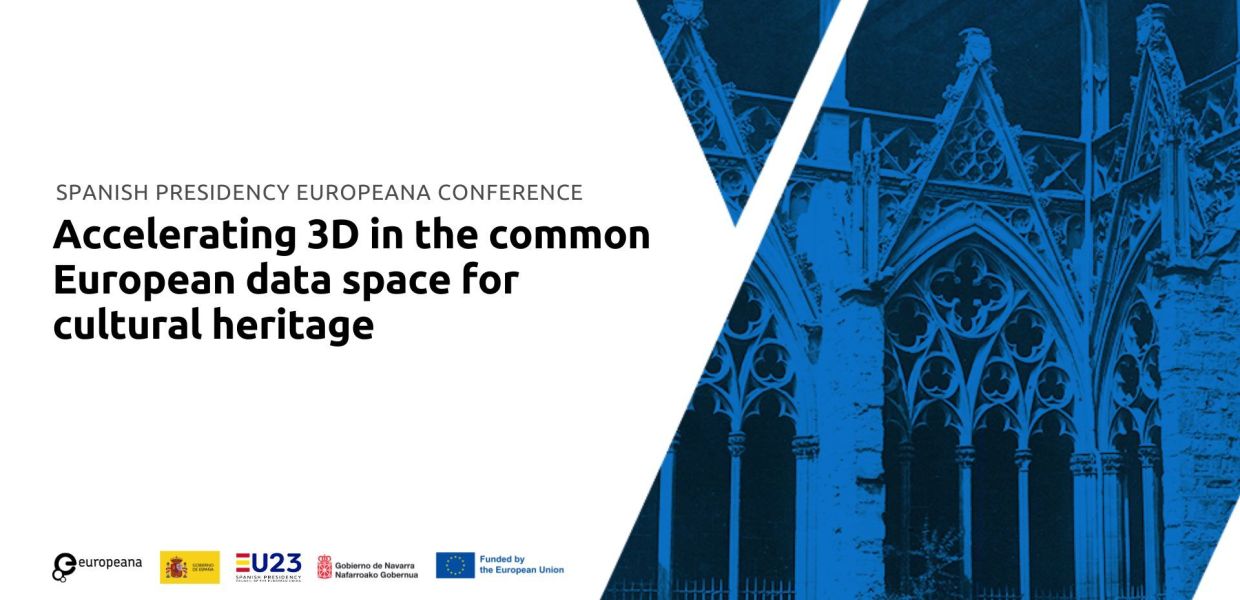Executive summary
Spain held the presidency of the Council of the EU in the second half of 2023. A major focus of the Spanish Presidency’s priorities in the area of culture was to advance a common understanding of culture and cultural heritage as a global public good, a core principle shared by the Europeana Initiative. Under the Spanish Presidency in September 2023, the EU Ministers of Culture adopted the 'Cáceres Declaration'. The declaration is a commitment of the 27 Member States to ensure that, ‘culture is henceforth considered an essential public good, and a global public good at the highest political level’.
The 2021 European Commission Recommendation on a common European data space for cultural heritage encourages EU Member States to step-up digitisation efforts, with a special focus on 3D, and make more content available through Europeana.eu and the data space. To support these goals, the Europeana Initiative and the European Commission launched the Twin it! 3D for Europe’s culture campaign in June 2023, under the auspices of the Swedish and Spanish Presidencies, and culminating during the Belgian Presidency.
It is in this context that the Spanish Presidency Europeana Conference Accelerating 3D in the common European data space for cultural heritage: Building Capacity for 3D was held on 17 October 2023, in Pamplona and online.
Spain has been a founding member, close partner and supporter of the Europeana Initiative since 2008. This hybrid conference was made possible thanks to the Spanish Ministry of Culture and Sport and the hospitality of the Government of Navarra, under the auspices of the Spanish Presidency.
The event involved 320 participants, of which 245 attended online and 75 participated in Pamplona. It brought together policymakers from European ministries of culture, the CEDCHE Expert Group, Twin it! campaign national contact points, delegates from the Spanish Ministry and Spanish cultural heritage institutions, representatives of the European Commission, experts in 3D and cultural heritage professionals from Spanish and European institutions. The event provided a forum for exchanging knowledge, experiences, and opportunities for collaboration, and received a satisfaction rate of 87% from participants.
Building on the reflections at the Swedish Presidency Europeana conference in April 2023, the Spanish Presidency conference featured keynote speeches, panel discussions, workshops, and interactive experiences.
In line with the objectives of the European Year of Skills (EYS) 2023, it engaged digital cultural heritage professionals and institutions to learn about 3D digitisation skills and workflows and processes. It aimed to stimulate a holistic discussion on 3D capacity building for the cultural heritage sector promoting collaboration among key actors and stakeholders. The event highlighted some of the best practices for utilising 3D technologies to advance preservation, access and reuse of cultural heritage. Some of the aspects and considerations essential for building capacity of institutions and professionals for 3D digitisation under discussion were:
- Technological infrastructure:
Hardware requirements (e.g., scanners, cameras, computers)
Software tools for 3D modelling, rendering, and data management
Network infrastructure for data storage and sharing
- Training and skills development:
- Financial resources:
Funding for equipments, training and digitisation projects
Engagement with policymakers to promote supportive legislation and funding initiatives
- Quality and standards:
- Long-term strategies:
Development of strategies for 3D digitisation and long-term preservation of 3D digital assets
Strategies to future-proof 3D digital content: sustainability and longevity of 3D data
Development of institutional policies on 3D digitisation, access, and reuse
- Collaborations and partnerships:
With 3D expert and technology companies
With other cultural heritage institutions for knowledge sharing and resource pooling
At European level through the Europeana Initiative and the data space
- Legal considerations surrounding 3D digitised content
- User engagement, education, tourism and research
Development of educational materials and interactive resources in 3D for public engagement
3D content for schools and education communities
Integration of 3D digital content into exhibitions and educational programs
Engagement with cultural tourism initiatives and researchers
The reflections by the speakers and participants contributed to a greater awareness of the collective efforts that are needed to build 3D capabilities and to advance the targets for 3D content in the data space for cultural heritage.
Building on the outcomes of this meeting, the Europeana Initiative will continue to facilitate conversations and capacity building activities for 3D digitisation of cultural heritage, for example the Twin it! Webinar series by 4CH.
When the Twin it! campaign comes to an end in June 2024, coinciding with the Belgian Presidency of the EU, a joint event by the European Commission and the Europeana Initiative will showcase the achievements of Twin it!. It’s crucial to keep the momentum of the campaign going and to ensure the targets of the 2021 Commission’s Recommendation are met. These targets are a collective ambition and responsibility which require commitment, determination and cooperation. All actors and stakeholders need to be motivated and invested and work collaboratively to meet the targets.
The Europeana Initiative continues to support the Member States to actively participate in the Twin it! campaign and build on the resulting experience and learnings. It also supports capacity building of heritage professionals and institutions in creating and making available purpose-oriented high-quality 3D data in the data space well beyond the campaign. The Europeana Initiative develops frameworks to support 3D digitisation and reviews the Europeana Publishing Framework, the Europeana Data Model, and the Europeana Licensing Framework to address the requirements and opportunities for 3D data aggregation in the data space.
Europeana Foundation


